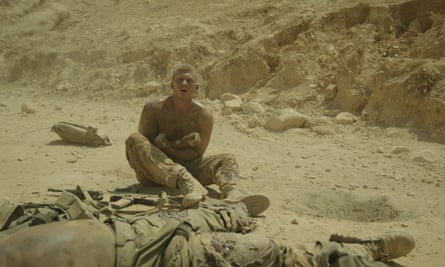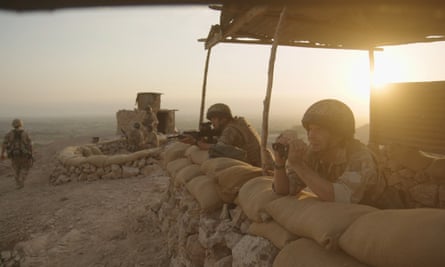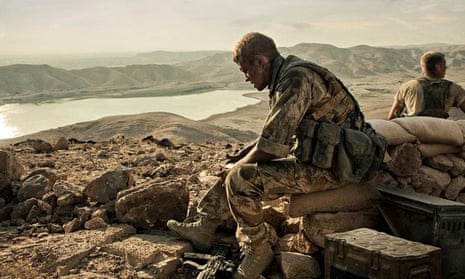Kajaki: The True Story (2014)
Director: Paul Katis
Entertainment grade: B+
History grade: A
The 3rd Battalion, Parachute Regiment (known as 3 Para) of the British army originated in the second world war. The 3 Para Battle Group was deployed in Afghanistan in 2006.
Politics
The film begins on 5 September 2006 near the Kajaki dam in Helmand province. One of the men of 3 Para is addressing two Afghan boys who have just nearly killed him while indulging in the adorable childhood pastime of grenade-fishing. “I’m here trying to bring peace and love to your fucking stone-age country,” he explains. “Don’t pick a fight with an armed midget,” his buddy warns him. The unspoken question behind the film is set up: what are British soldiers doing in Afghanistan, anyway? Some critics have felt this film lacks engagement with the local population or the wider scope of the war, but surely that’s exactly the point: these soldiers are just ordinary blokes (they’re all blokes), a long way from home, doing an incredibly dangerous job without much sense of why.
History
The film neatly underlines this when the men return to Observation Post Normandy, a tiny camp at which members of 3 Para Mortar Platoon and 3 Para Support Company are bivouacked. One of the soldiers, armed with a Penguin classics edition, reads out a few lines of a poem: “When you’re wounded and left on Afghanistan’s plains/ And the women come out to cut up what remains/ Jest roll to your rifle and blow out your brains/ An’ go to your Gawd like a soldier.” This is from Rudyard Kipling’s The Young British Soldier, published in his 1892 volume Barrack-Room Ballads. It is quoted in Patrick Bishop’s 3 Para, a gripping history of the battle group in Afghanistan. There and here, it makes an important point: that the most recent Afghanistan campaign has historical echoes in the Anglo-Afghan wars of the 19th century.
Legacy
The soldiers spot what appears to be an illegal Taliban checkpoint set up on the road below their observation post. It’s too far away for a sniper to take out the suspects, so they decide to go down to investigate. “This country’s full of shit left behind when armies fucked off,” says one. “Russians, it was the mines. Ten million fucking mines. God knows what we’re going to leave behind.” Good question.
Disaster

Three soldiers walk down a goat track towards the checkpoint. Then, all of a sudden, Lance-Corporal Stuart Hale (Benjamin O’Mahony) finds one of those Soviet mines. “I didn’t see a flash or feel a blast or heat,” the real Hale said later. “It was as if I’d stood on a banana skin.” The bottom half of his leg is gone. Medic Lance Corporal Paul “Tug” Hartley (Mark Stanley) hurries down with other soldiers. Though they take precautions in trying to reach Hale, there is soon another explosion and more are wounded. Corporal Stuart Pearson (Scott Kyle) has to deal with his own leg being blown off (everyone in 3 Para had basic medical training, as you might glean from the film). One of the men present, Private Jay Davis, said of Pearson’s reaction in real life: “He put the tourniquet on himself, put morphine into himself and we just had to leave him.” A Chinook helicopter arrives to save the men, but it can’t land because they are, of course, in a minefield – and it isn’t equipped with the winches it needs to hoist them up. Unfortunately, this is accurate. As the Chinook leaves, it whips up a dust cloud – and another mine is set off.
Humour

Despite the fact that so many of them were seriously injured, Patrick Bishop’s account specifically says the men kept a sense of humour throughout their six-and-a-half-hour ordeal: “[Corporal Mark] Wright made brave jokes about the amount of insurance that would be coming to him.” The film’s strong screenplay, by Tom Williams, captures the tone of the soldiers’ dialogue authentically – tough, practical and witty, with any hint of sentimentality quickly cut down. “I’ll be legless every night now,” ruminates one of the wounded. Not only is this accurate; it’s also in a long British army tradition that you can see a century ago in the popular first world war commemoration volume 500 Cockney War Stories. In that book, one cricket-loving soldier is said to have reacted to having two comrades killed and his own leg blown off by reporting: “One over – two bowled – and I’m stumped.”
Verdict
Kajaki is an unusual war film: rather than focusing on combat, it shows a foreign army dealing with the legacy of previous foreign armies in a much-invaded territory. It’s a fascinating and apposite take on the war in Afghanistan – and one which takes care to get its facts right.

Comments (…)
Sign in or create your Guardian account to join the discussion